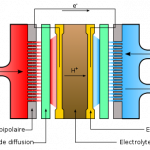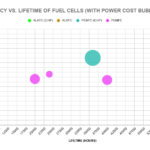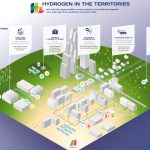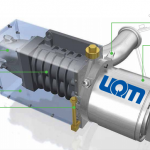List of Fuel Cell Stocks
Fuel cell stocks are publicly traded companies whose business involves fuel cells, devices for efficiently converting the energy in a fuel (often hydrogen) directly into electricity by chemical means, without combustion. Applications include road transport, large-scale energy storage and short-haul transport such as forklifts.
This list was last updated on 5/6/2021
AFC Energy (AFC.L)
Ballard Power Corporation (BLDP)
Bloom Energy Corporation (BE)
Cell Impact AB (CI-B.ST)
Ceres Power Holdings PLC (CPWHF)
Enova Systems (ENVS) - out of business since 2015.
FuelCell Energy (FCEL)
Impact Coatings AB (IMPC.ST)
ITM Power (ITM.L, ITMPF)
McPhy Energy SA (MCPHY: PA)
myFC Holding AB (MYFC.ST)
Neah Power Systems (NPWZ)
Nikola Corporation (NKLA)
Plug Power (PLUG)
PowerCell Sweden AB (PCELL.ST, PCELF)
Proton...
Hydrogen Fuel Cells: Comparing Efficiencies
The previous articles in this series focused on the power costs and operational lifetimes of hydrogen fuel cells. These factors are important, as cheaper and long-lasting fuel cells are vital for the adoption of hydrogen as a fuel. (For details of how these cells work, refer to the first article).
Cost and durability are far from being the only characteristics of fuel cells worth consideration. Here we focus on fuel cell efficiency - this is the proportion of the chemical energy stored within the hydrogen supplied to the fuel cell, that is eventually converted into usable electricity.
The graph shows the...
McPhy: Growing With Hydrogen
by Debra Fiakas, CFA
Hydrogen system developer McPhy Energy SA (MCPHY: PA) recently reported impressive sales growth in the first half of 2019 - 23% higher than last year. Sales were boosted by delivery of a refueling station in Houdain, France for a bus operation that is 100% powered by hydrogen. New orders for projects in Germany, Bangladesh and Switzerland will keeps the company busy in the month ahead installing additional hydrogen fueling stations and electrolysis equipment for hydrogen production.
Despite the success, McPhy has not achieved profitability. Thus the company remains dependent upon financing to support operations. In 2017, the company secured an equity sales agreement with Kepler...
Shareholders Cry Foul as UQM Agrees to Buyout
UQM Technologies (UQM: NYSE) has agreed to be acquired by Danfoss Power Solutions for $1.71 per share in cash, providing a deal value near $100 million. UQM leadership expects timely review by government authorities and has recommended approval of the deal by shareholders. A date has not been set for the required shareholder vote. Assuming all goes according to schedule, a deal closing is possible sometime in the second quarter 2019.
Electric propulsion and generation technologies are at the core of UQM’s solutions for manufacturing, transportation and power industries. The substitution of electric motors for combustion engines has been driving demand for the UQM’s products. Market opportunities have abounded...
Hydrogen Cars Are Almost Here, But…
BusinessWeek Online has published an interesting article that discusses the January Auto Show and the future of H2 cars. When it comes to hydrogen vehicles, most car companies are counting on little under-the-hood chemical refineries known as fuel cells. Trouble is, a fuel-cell system powerful enough for a car would add roughly $100,000 to sticker prices today. And then there's an even tougher problem: Where would drivers get the fuel? Fewer than 100 filling stations in the whole world now pump hydrogen. So it could be a couple of decades before fuel-cell cars become popular enough to make...
Introduction to Fuel Cell Technologies
Fuel cell technology is vital to building the hydrogen economy. Fuel cells combine hydrogen and oxygen into water, while generating a current and some heat energy. Thus, they are used to retrieve stored energy from hydrogen as electricity in large-scale stationary applications, and convert hydrogen fuel to power in automobiles.
This article introduces a series on fuel cell technologies which will explore the various technologies, the efforts and challenges to improving them, and their prospects for wide-spread adoption.
There are a range of fuel cell technologies. The two most prominent are alkaline fuel cells (ALKFC) and proton exchange membrane fuel cells...
Alkaline Fuel Cells – In Need of Revival
The previous article in this series on hydrogen fuel-cells focused on proton-exchange membranes fuel cells (PEMFCs). These cells have been the interest of the industry in recent years, and make up the majority of the market. However, it is also worth discussing alkaline fuel cells (ALKFCs), an older variety of cells that remain prominent today. (For details on how these cells work, refer to the first article in this series).
The graph shows the power costs ($/kW) of PEMFCs and ALKFCs as the technology has advanced over time. In other words, it plots the initial capital cost for every 1...
Mantra Energy: The Future of Portable Fuel Cell Technology?
by Lee Shane When one thinks of fuel cells and fuel cell technology some names immediately come to mind. Ballard Power (BLDP) went public in 1993 and was listed on NASDAQ in 1995. A company that made its debut in 1997 was Plug Power (PLUG), a joint venture between DTE Energy and Mechanical Technology Inc. Hydrogenics (HYGS) is a company that has been around for 60 years, but more recently has gotten investor attention for their fuel cell technology. Most of the technology produced by well-known fuel cell companies share common features… They are based on...
PEM Fuel Cells – Hoping to Challenge Internal Combustion
The first article in this series introduced the two prominent types of hydrogen fuel cells - alkaline fuel cells (ALKFCs) and proton-exchange membrane fuel cells (PEMFCs). Fuel cells are devices that convert stored hydrogen into usable energy, and constitute an essential part of the hydrogen economy. Subsequent articles shall focus on various characteristics of these two cells.
The graph above shows the power costs ($/kW) of PEMFCs and ALKFCs as the technology has advanced over time. In other words, they show the initial capital cost for every 1 kW of fuel cell capacity (note that this axis is in the...
Fuel Cell Companies Purchased for Portfolio
I placed several trades for the mutual fund this afternoon to start building a position in some of the fuel cell companies. This sub-sector has been under pressure the last couple of months but seems to be building a nice base of support at the current levels. I feel this entire sub-sector is ready for a nice up move and the stocks have been behaving nicely the last week or so. The one stock I seriously considered not adding was Quantum. The stock has been in a steady decline and there is no sign that it’s going to slow...
Newsweek Special Report
"Experts generally agree that our current reliance on fossil fuels is unsustainable. Already oil is near $50 per barrel, and the great millions of Chinese and Indians destined to take to the road in the next decades have not yet gotten behind the wheel." This week Newsweek has written several special reports about alternative energy in all its forms. All of these reports can be found at the following link.
SFC Energy: Growing Remote Power
by Debra Fiakas CFA Fuel cell developer SFC Energy, A.G. (F3C.DE) recently came calling on money managers in New York City. The company’s chief financial officer Steffen Schneider wants U.S. investors to know SFC has more going for it than simple fuel cells. True enough the company sells fuel cell components, but it is also capable of delivering complete off-grid energy solutions and integrating full systems. Schneider talks up SFC’s sterling customer list, including Volkswagen, Siemens, Schlumberger, Shell Oil, Arch Coal, Conoco-Phillips, and other industrial users. Then there are government agencies such as NATO, the FBI in...
$3 Billion For Cleantech & Alt Energy
Charles Morand The DOE made public earlier today the amount of money that will awarded to clean power projects in lieu of the usual tax breaks: $3 billion. This will allow project proponents to receive a direct cash grant now instead of a Production Tax Credit or an Investment Tax Credit later on. The guidance document notes the following: "Section 1603 of the Act’s tax title, the American Recovery and Reinvestment Tax Act, appropriates funds for payments to persons who place in service specified energy property during 2009 or 2010 or after 2010 if construction began...
Hyster-Yale’s Fuel Cell Deal
by Debra Fiakas CFA Near the close of 2014, Nuvera Fuel Cells was acquired by NACCO, an operating company of Hyster-Yale Materials Handling, Inc. (HY: NYSE). Nuvera sells a proprietary fuel cell stack under the brand name Orion for industrial mobility, automotive and aerospace applications. The company also sells its PowerTap Hydrogen Station for on-site hydrogen generation (see image below). The purchase price was not disclosed and Hyster-Yale has not provided guidance on how the deal will impact its sales and earnings in 2015. Apparently, Nuvera’s sales and earnings are not material to Hyster-Yale in the...
Twelve Hydrogen And Fuel Cell Stocks
Tom Konrad CFA While many people think first about hydrogen when they think of fuel cells, fuel cells are not limited to hydrogen. They are a set of related technologies, many of which can generate electricity from a number of hydrocarbon fuels rather than hydrogen. I limited my recent post on the rapid rise of hydrogen stocks to just US-listed companies involved in the production and use of hydrogen, leaving out foreign stocks and other fuel cell technologies for brevity. In my research for that article, however, I came across fully ten publicly traded companies involved with...
Ballard Terminates Azure Hydrogen Licenses; Can It Find A Better China Partner?
by Debra Fiakas CFA Before the open of the first trading day of 2015, fuel cell developer Ballard Power Systems (BLDP: Nasdaq) announced the termination of technology licenses to Azure Hydrogen, which was to have been Ballard’s introduction to the China market. The license agreements covered the sale of Ballard’s bus power module and telecom backup power system. Ballard has charged Azure with breaching the agreements and the two companies have apparently not been able to come to alternative terms. Azure had made sales in the China and not all of the equipment had been paid. ...








